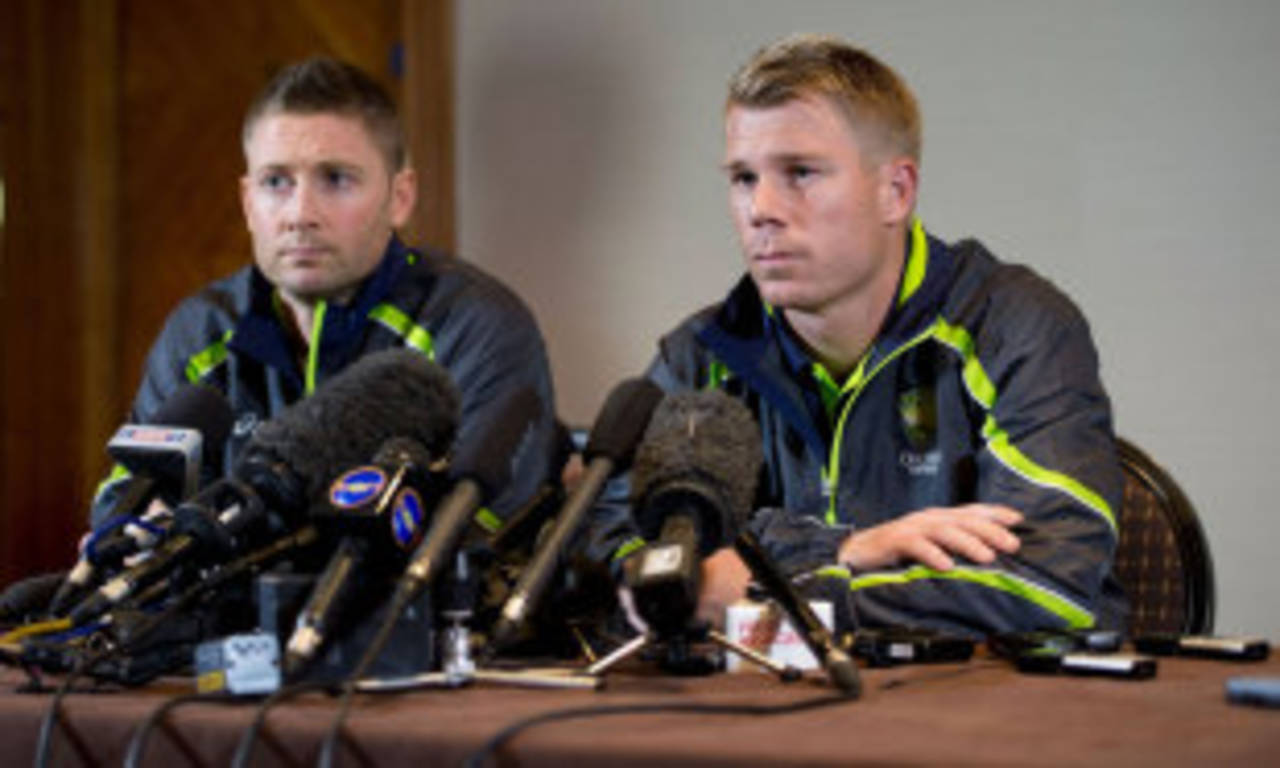Clarke's Ashes squad fragmented
A strong show of unity is needed after the problems that have dogged the start of their tour
Daniel Brettig in London
18-Jun-2013

Michael Clarke has already had to deal with several issues after just three weeks in England • Getty Images
Even if some of the more scurrilous rumours abounding from within the Australian cricket team are discounted, it is impossible to escape the symbolism of their current disposition. Day one of the tourists' Investec Ashes campaign ended the same way it began, with the 16 chosen squad members and their shadows dispersed across the United Kingdom. Whether by accident or design, this is more a fragmented front than a united one.
The majority, marshalled by the tour vice-captain Brad Haddin, have assembled in Bristol, where Australia A will play a three-day match against Gloucestershire from Friday. But the captain, Michael Clarke, along with Shane Watson, David Warner, Mitchell Starc and James Faulkner remain at the team hotel in London, where they will train this week in low profile sessions destined to serve primarily as an elongated fitness test for Clarke's back.
On Wednesday they will be joined by the opener and Middlesex captain Chris Rogers, now excused from his county duties and readying himself for a final tilt at international recognition. Champions Trophy squad members not required for the Ashes will drift away in dribs and drabs, some like Adam Voges and Glenn Maxwell contracted for English Twenty20 japes, others like George Bailey and Nathan Coulter-Nile heading back to the Australian winter. Then there is Ed Cowan, still in Nottingham on county secondment, and not likely to join his Australia colleagues until Monday in Taunton, dubbed the "official" starting point of the Ashes tour.
All these players are eager to prepare for the Ashes. Save for Rogers and perhaps Cowan, all are in urgent need of strong first-class grounding for the battles to come, for confidence as much as familiarity with the Dukes ball and occasionally capricious English pitches. And all would wish to distance themselves from the horrid start to the tour, featuring as it has an injured, absentee captain, a timid first encounter with England, a drunken punch thrown by a foolish opening batsman, and a group quite happy to go out on the town until the small hours immediately after a bad defeat.
Problems on the field, off the field and in the spaces between will not repair themselves. Whatever has been said publicly by Clarke, Warner, Bailey and others, this is a team in desperate need of time together under firm leadership, to heal the ructions apparent over the past two weeks, and to re-focus on the steep task at hand. Early Champions Trophy elimination had afforded the team on tour a chance to assemble a week earlier than planned but it does not appear one that will be taken up.
Though this can mainly be attributed to reasons of back-related convalescence, Clarke has so far spent more time away from most of his team than he has done with them. The importance of a tour's early days to establish standards of behaviour and performance has been stressed by many, including the former England captain Michael Atherton. In this case there was an unmistakable sense of 'while the cat's away...' about the drinking transgressions in Birmingham.
"It wasn't the right thing to do after a loss, to go out and have a few beers"Phillip Hughes
Surprise that Clarke did not travel straight up to the Midlands from London at the first sign of internal trouble, no matter how bad the condition of his back, has competed with the ball-tampering allegations against England as the choicest of tournament gossip. Eyebrows are likely to be raised again at the news that Clarke will spend another week away from most of the players under his leadership, even if his trust in Haddin as the Australia A captain and tour lieutenant is absolute.
Phillip Hughes, who has been closer to Clarke than most, was happy to apologise for being out on the night in question. For years Australia's team culture was built along several unshakeable maxims, one of which was that the celebration of a win was to be long and raucous, but that the wake after a loss should be precisely the opposite. While it is an easier instruction to carry out when the team wins frequently, numerous players, former and current, were less disturbed by the notion that Warner punched Joe Root than the fact members of a team well beaten had no compunction about getting well liquored that same evening. Losses should hurt more than that.
"Everyone's accountable for it, it was after a loss and I was one of the guys who was out," Hughes said. "So I put my hand up and say it wasn't the right thing to do after a loss, to go out and have a few beers. It wasn't the right time or place. We've all got to learn from that and I'll definitely put my hand up and say it wasn't the right time. You want to win and have a beer after you win … We shouldn't have been out after a loss."
Hughes went on to take heart from the view that "we're all in it together". It was the right kind of sentiment, but for the moment it does not reflect the way the Australia team are playing their cricket, nor their geographical relationship to each other. Sporting history is littered with teams who played above their modest talent levels by binding together in collective effort and diligence, frustrating and confounding opponents with greater resources and reputations. Unfortunately for Australia's cricketers, right now they are defying one of the maxims of a rather more serious business, warfare: never divide your forces in the face of a superior enemy.
Daniel Brettig is an assistant editor at ESPNcricinfo. He tweets here